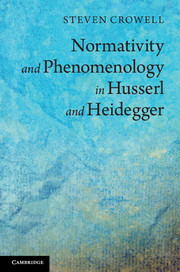Book contents
- Frontmatter
- Contents
- Acknowledgments
- Citation conventions for the works of Husserl and Heidegger
- Introduction
- Part I Transcendental philosophy, phenomenology, and normativity
- Part II Husserl on consciousness and intentionality
- Part III Heidegger, care, and reason
- 8 Subjectivity
- 9 Conscience and reason
- 10 Being answerable
- Part IV Phenomenology and practical philosophy
- References
- Index
9 - Conscience and reason
Published online by Cambridge University Press: 05 April 2013
- Frontmatter
- Contents
- Acknowledgments
- Citation conventions for the works of Husserl and Heidegger
- Introduction
- Part I Transcendental philosophy, phenomenology, and normativity
- Part II Husserl on consciousness and intentionality
- Part III Heidegger, care, and reason
- 8 Subjectivity
- 9 Conscience and reason
- 10 Being answerable
- Part IV Phenomenology and practical philosophy
- References
- Index
Summary
Transcendental philosophy and intentionality
According to Kant, transcendental philosophy embodies that kind of knowledge “by which we know that – and how – certain representations … can be employed or are possible purely apriori”; that is, “such knowledge as concerns the apriori possibility of knowledge, or its a priori employment” (1968, p. 96 [A56/B80]). In Kant’s language, to say that a representation is “possible” is equivalent to saying that it can be “employed,” and that, in turn, is equivalent to saying that it has “content,” that is, “relation to [an] object” (1968, p. 100 [A63/B87]). All representations, as such, purport to have content, but not all of them do. In showing “that and how” representations can have content, transcendental philosophy is concerned with the issue of intentionality, with showing that entities in the world are there for us, how our mental life discloses what there is. At first, however, its approach to this issue seems restricted to showing “that and how” certain representations can have a relation to objects “purely a priori” – that is, without reference to any experience in which objects can be given. In this sense, transcendental philosophy specifically concerns the intentionality of reason, where reason is the power of producing representations whose purported content does not derive from experience. How can representations that have their seat purely in thinking be shown to have a relation to an object? Kant answers that this is possible only if the content of such representations can be shown to be the condition for the possibility of intentionality as such, that is, only if it makes “objects” – entities as they are there for us – possible. In fact, then, the Critique of Pure Reason’s approach to the question of intentionality is not at all restricted. By showing that and how certain representations are employable a priori it shows how any representation could have relation to an object at all.
- Type
- Chapter
- Information
- Normativity and Phenomenology in Husserl and Heidegger , pp. 191 - 213Publisher: Cambridge University PressPrint publication year: 2013
- 1
- Cited by

